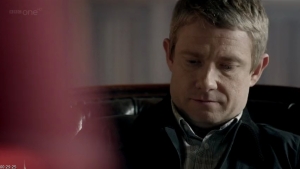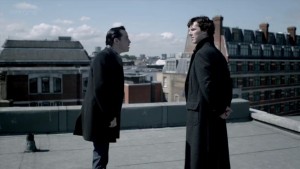jason stives reviews ‘The Reicenbach Fall’ …
The second series of Sherlock has ended the same way it started — with the proverbial bang, and what a bang it was, no thuds at all. A lot of praise must be given to everyone who has worked on the series for providing a riveting and thought-provoking run that told the dreaded tale of Sherlock Holmes and his pursuit and eventual confrontation with “The Napoleon of Crime,” James Moriarty.
The final installment, “The Reichenbach Fall,” is a no-brainer to fans of Arthur Conan Doyle’s famed detective, as this title strongly hints to the story’s expected but still head-scratching climax. And even with that in mind, there was a constant question of what to expect next. In the end, what was given to us was probably the best episode of Sherlock to date — it was both nail-biting, heartbreaking, and a proven example as to why the creators of this show have some of the keenest eyes for thrilling television (in the U.K. at least).
The episode begins with a fantastic and shocking realization: Sherlock Holmes is dead. As John Watson sits in a dark room talking to his therapist, we learn that his dearest friend has met a demise; a demise that will unfold over the next 90 minutes. From here, we begin with a daring break-in at the Tower of London, the Bank of England, and a high security prison — all at the hands of Moriarty and a simple touch of his iPhone. But it’s much more than a bunch of break-ins. It’s part of a long-threaded plot to destroy the reputation of his equal (Holmes). Much has come from this season’s exploration in Holmes’ personal life, and because of that Watson has shown his worth as an entity other than Holmes’ partner in crime. Holmes here finally comes unraveled as he sees what his need to impress and his sudden celebrity status does to the people who ultimately believe in and care about him. At one point in figuring out a mysterious kidnapping involving the Grimm’s fairytale Hansel And Gretel, Holmes is brought down to reality after lab tech Molly explains that she sees the sadness and worry in his eyes and that he is human, even if he acts like he is of a higher authority. For someone who has regularly been Sherlock’s punching bag, it was nice to see Molly do something that brought about a change in Holmes’ assumptions of people — that they can read him far better than he gives them credit for.
Benedict Cumberbatch pours on a wonderful performance that shows Holmes at his most vulnerable and also his most fascinating. While there are some great moments of clue jargon that show why Cumberbatch was perfect for the role, it’s the moments when Holmes realizes he is wrong that shows how well-rounded he is as an actor. The final confrontation between Holmes and Moriarty shows this, and Cumberbatch delivers one of the most distressing dialogues between him and Watson because of his miscalculation. Martin Freeman, on the other end of the spectrum, once again shows how great he is as a leading man and is just as involved in the case as Holmes is. When everyone begins to question the truth in Holmes as a world-class detective, Watson never once loses his faith and it’s a camaraderie that has been brewing since the first episode in 2010. The sadness in Watson as he recounts the events leading up to the supposed death of Sherlock are tragic but solemn at best because sometimes all good heroes must fall.
A lot of this wonderful acting stems from the actions and reactions in regards to Holmes’ greatest threat. All great heroes in fiction have their evil doppelganger, the person who best embodies all their qualities but in the most evil and sometimes disturbing ways. Batman has his Joker, the Doctor has the Master, and Holmes has Moriarty — a man who appeared in all but two official Holmes stories. Here, Moriarity has been given a texture that both fascinates and crawls under the viewer’s skin. Much of this has to do with the performance of Andrew Scott, who gets the most screen time the character has had since he was first revealed at the end of Series one. Scott is a juggernaut of suspense by being misleading, halfheartedly right in his presentation, and undeniably a psychopath, something never displayed in previous portrayals of the character. His intent here is to bring about the demise of Holmes in a way that is both obsessive and a way of bringing Holmes down to the care of common folk, something no one, save for Irene Adler, has been able to do in the show’s run. Equality is much in showing Sherlock’s true colors, and who better than Moriarty — a man who lives to impress but unlike Sherlock who impresses everyone, the sick twisted mind of James is to simply impress one man.
If I may get personal for a second, something I try to avoid in most reviews, I am of the firm belief that nothing is more exciting in good versus evil stories than when the protagonist and the antagonists finally meet one on one. In that moment, two clear equals, their difference being that they are on opposite sides of the law, is like watching two people at the center of the universe, and it’s about to be destroyed. The notion of two people who can have easily the same amount of power, but one with more of cruel intent is exciting to watch. That being said, the confrontation between Holmes and Moriarty in his apartment is spell binding with, Moriarity clearly stating what is always the intent of these meetings — the importance of every fairy tale having a villain. It’s the classic “without me you are nothing” speech but told with a serpent-like texture from Moriarty. Holmes engages in this tangled web regardless of its danger as Moriarty tells Holmes over tea that his fall will come and Sherlock welcomes this. This isn’t just two ordinary people, these are men with vendettas and a lot of people can get hurt regardless of either’s intent being good or evil.
The plot that Moriarty devises to ruin Holmes leaves even the viewer questioning the validity of Holmes as a detective even if we have clearly seen him unravel so many mysteries over six episodes. A constant abuse of the tabloids that involves an actor claiming to be hired by Holmes to play Moriarty and the suspicion of him being involved in a kidnapping casts a grim shadow over our hero’s fate, and it ends in the most shocking of fashion. It all lies in how much you believe the truth in Moriarty’s plan, and there are times even I questioned what was really happening even if the answer was always clear that Sherlock is for real.
Of the three serials, this is the most balanced when it comes to an engaging case and tons of character development. Writer Steve Thompson, who wrote the previous season’s “The Blind Banker,” executes a heart-pounding episode that not only wraps up a great deal of much needed character history but also creates an interesting conundrum: Where does the show go from here? With a third series announced mere hours after this episode’s airing, we can only assume we will be waiting a long time once again before any answers are explained. Executive producer Steven Moffat is set to resume filming on the next series of Doctor Who in mere weeks (joygasm!), and both Benedict Cumberbatch and Martin Freeman are getting ready to take Hollywood by storm (Freeman and Cumberbatch are starring in The Hobbit and Cumberbatch will be the villain in the next Star Trek film), it may be a much longer wait than usual. That being said, Series 2 of Sherlock proved to be a non-stop thrill ride, and while at times it hit some rough patches shows that this modern-day take of the Detective of Baker Street is the real McCoy and that Holmes and Watson are still relevant in the 21st century.
Rating: 10 out of 10 (Amazing)






not a 10 out of 10, more an 8 out of 10 (for the acting and suspense).
it’s not about the huge amount of questions the finale leave behind,
it’s more the final answer of Holmes. None of the I-see-through-all-your-tricks
or here-is-the-clever-way-out-noone-but-me-thought-about.
No, Holmes just tricking everyone with his fake death is not Holmes-like-smart, as well as Morijaty killing himself for such low gain. I hope so much that the 3rd season will start of with a mind blowing what?-did-he-really-do-that?-damn!…wishes: Jim comes back and Sherlock brings the Sherlock thinking back.
PS: Who reads the Sun? It’s not a fairy tale, more like the story-set of a drunken man…